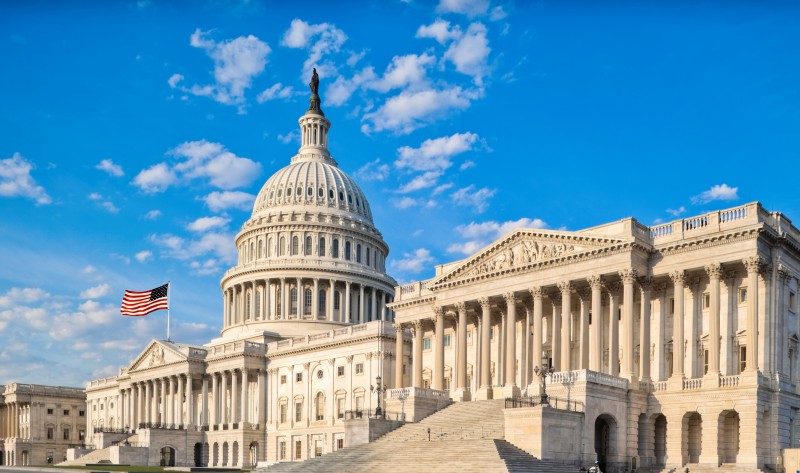
Proposed legislation could update antitrust legal standards and the U.S. government’s enforcement capacity.
Antitrust reformers have proposed a new Golden Rule for big tech companies: Tweet others in the marketplace as you would want to be tweeted. If such companies fail to follow this rule, they would be sued under a stricter law with heightened penalties.
In recent months, the U.S. government has scrutinized companies that dominate the tech market. Now a sweeping new bill may give federal regulators additional tools for combatting those companies’ alleged monopolistic practices.
The proposed Competition and Antitrust Law Enforcement Reform Act was introduced in early February by U.S. Senator Amy Klobuchar (D-Minn.), the new chair of the Senate Judiciary Committee’s antitrust subcommittee. The “unprecedented, comprehensive, and bold” omnibus bill presents a buffet of mechanisms for tackling dominant firms across the U.S. economy, with significant implications for the tech sector.
The bill focuses on amending the Clayton Act to make anticompetitive mergers more difficult for powerful firms such as Facebook and Google. In conjunction with the Sherman Act—the bedrock of U.S. anti-monopoly laws—the Clayton Act regulates practices, such as merger and acquisition deals, that the Sherman Act itself does not bar. Historically, such deals have been prohibited if they “substantially” decrease market competition or “tend to create a monopoly.”
Proponents of the Reform Act argue that because judicial decisions and federal enforcement policies have weakened the Clayton Act over time, it should be altered to enable regulators to prohibit mergers that would have potential anticompetitive effects, such as “reduced choice, reduced innovation, the exclusion of competitors, or increased entry barriers” for smaller companies.
This new risk-based standard would bar any merger that has an “appreciable risk of materially lessening” competition in the company’s market, with “material” meaning “anything more than a trivial amount.” By replacing the Clayton Act’s current standard of showing a “substantial” reduction in competition, the Reform Act would lower the threshold for bringing enforcement actions. The bill would further alter the legal standard by shifting the burden of proof, so that market-dominant companies would need to show that their conduct is not anticompetitive.
In addition, the Reform Act would aim to improve the effectiveness of the federal government’s two primary antitrust enforcement agencies by increasing both their funding and the maximum fines that they can levy for antitrust violations. The bill would add over $484 million and $651 million to the current annual budgets for the U.S. Department of Justice and the Federal Trade Commission (FTC), respectively.
As for penalties, the bill would raise maximum civil fines under the Sherman Act and Clayton Act to either 15 percent of a company’s U.S. revenues from the prior year or 30 percent of a company’s revenue stemming from the unlawful conduct.
Finally, the Reform Act would also create an independent Office of the Competition Advocate within the FTC, tasked with publishing periodic reports on U.S. market trends, helping agencies to gather information on regulated companies, and collecting data on the efficacy of antitrust enforcement efforts.
These major proposed changes to antitrust regulation are only the latest—and boldest—legislative effort seeking to rein in tech companies. In October, the majority staff of the House Judiciary Committee’s antitrust subcommittee released an exhaustive report alleging that Apple, Amazon, Google, and Facebook have abused their market power. The subcommittee described how these once “scrappy, underdog startups” exploited their dominant positions, mutating into the kinds of monopolies last seen “in the era of oil barons and railroad tycoons.” Although the subcommittee emphasized the need for better enforcement of existing laws, it also recommended some reforms.
But for some politicians, the structural changes described in the Reform Act would go too far. Several congressional Republican leaders called for ongoing investigations of tech companies, but they were quick to specify a preference for “targeted antitrust enforcement over onerous and burdensome regulation.” The Senate Judiciary Committee’s antitrust subcommittee’s ranking Republican, U.S. Senator Mike Lee (R-Utah), expressed skepticism as to the Reform Act’s focus on updating legal standards, arguing that preexisting laws are adequate if “properly enforced” and that legal reforms are a “non-starter.”
Ongoing antitrust lawsuits provide examples of enforcement efforts under current law. Shortly after the subcommittee report’s release, the Justice Department and 11 state attorneys general prosecuted Google, alleging that the company has monopolized the search services and search advertising markets “through anticompetitive and exclusionary practices.”
Two months later, the FTC sued Facebook, arguing that the company has illegally maintained a social networking monopoly by gobbling up rivals in acquisition deals and by “imposing anticompetitive conditions on software developers.” The New York Attorney General also led a group of 48 attorneys general in a separate suit against the company.
Even as these lawsuits continue onward, some signs suggest that Republicans’ attitudes toward antitrust reform may be changing. On the heels of the Reform Act, a proposal from U.S. Senator Josh Hawley (R-Mo.) to prohibit big tech companies from acquiring smaller businesses seems to indicate that at least some Republicans may be willing to join the Democrats’ narrow majority in the U.S. Congress in voting for Senator Klobuchar’s bill.
So far, the tech companies themselves have appeared to respond to the Reform Act with silence—although Facebook has criticized ongoing lawsuits as presenting a “revisionist history” of antitrust law. Even if Facebook decides to keep quiet on the Reform Act until Congress decides the bill’s fate, the company might still wish to consider changing its status to “nervous.”



